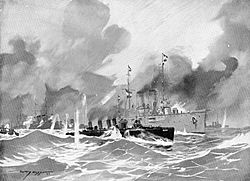Battle of Antivari facts for kids
Quick facts for kids Battle of Antivari |
|||||||
|---|---|---|---|---|---|---|---|
| Part of the Mediterranean Theater of World War I | |||||||
 Painting showing SMS Zenta and SMS Ulan in the Battle of Antivari |
|||||||
|
|||||||
| Belligerents | |||||||
| Commanders and leaders | |||||||
| Strength | |||||||
| 2 dreadnoughts 10 pre-dreadnoughts 6 armoured cruisers 1 protected cruiser 20+ destroyers |
1 protected cruiser 1 destroyer |
||||||
| Casualties and losses | |||||||
| 2 pre-dreadnoughts damaged 2 destroyers damaged |
173 killed 50+ wounded 1 destroyer damaged 1 protected cruiser sunk |
||||||
The Battle of Antivari was a sea fight at the start of World War I. It happened on August 16, 1914. A large fleet of French and British warships fought against two ships from the Austro-Hungarian navy.
The Austrian ships, the SMS Zenta (a protected cruiser) and the SMS Ulan (a destroyer), were blocking the port of Antivari in Montenegro. They were surprised by the much larger French and British fleet. The Zenta fought bravely to help the Ulan escape. The Zenta was sunk, but the Ulan got away. The main Austrian fleet did not join the battle.
Contents
What Led to the Battle?
When war began between Austria-Hungary and Montenegro, the Austro-Hungarians started blocking Montenegro's coast. They also attacked towns like Antivari (now called Bar). The ships Zenta and Ulan were part of this blockade.
The French Navy wanted to draw the Austro-Hungarian Navy into a big battle. So, they sailed a large fleet into the Adriatic Sea. This Allied force was very strong. It included many powerful battleships and destroyers. The main Austrian fleet did not know the Allied ships were there until the Ulan sent a radio message during the battle.
The Battle Unfolds
The Allied fleet managed to trap the Zenta and Ulan. They were cut off from their main base at Cattaro. The Austrian ships were greatly outnumbered.
Captain Paul Pachner, the commander of the Zenta, decided to fight. His goal was to give the Ulan a chance to escape. The Zenta's guns were much smaller than those on the Allied ships. This meant the Allied ships could hit the Zenta from far away.
French battleships hit the Zenta many times. The French ships were not damaged at all. The Zenta was eventually sunk. Sadly, 173 men were killed and over 50 were wounded. But because of the Zenta's sacrifice, the Ulan was able to get away safely.
After the Battle
The main Austro-Hungarian fleet at Cattaro did not know about the battle until it was almost over. So, they did not sail out to fight the French, as the French had hoped.
The French ships were not damaged by Austrian fire. However, some of their own guns had problems. The next day, some French ships were damaged in accidents.
The battle ended the Austro-Hungarian blockade of Montenegro. This was a success for the Allied forces. The French fleet could not stay in the Adriatic Sea for long. They had to return to Malta often for supplies.
Who Fought in the Battle?
Here's a simple look at the naval forces involved:
The French fleet was very large and powerful. It included:
- Two dreadnought battleships: these were the most modern and powerful battleships of the time.
- Ten pre-dreadnought battleships: older but still very strong battleships.
- Four armoured cruisers: fast ships with good armor.
- One protected cruiser: a ship with armor protecting its important parts.
- Three squadrons of destroyers: fast, small ships used for torpedo attacks.
The British Royal Navy also had ships in the battle:
- Two armoured cruisers: HMS Warrior and HMS Defence.
- Four destroyers.
The Austrian force was much smaller:
- The SMS Zenta, a protected cruiser.
- The SMS Ulan, a destroyer.
There were also some auxiliary ships like the SMS Monarch (1895) and SMS Panther (1885) and two destroyers, but they were not directly involved in the main fight.
 | Sharif Bey |
 | Hale Woodruff |
 | Richmond Barthé |
 | Purvis Young |

